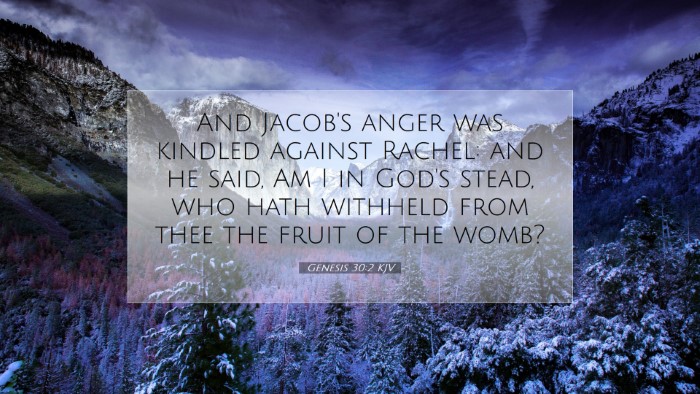Commentary on Genesis 30:2
Genesis 30:2 states, "And Jacob's anger was kindled against Rachel: and he said, Am I in God’s stead, who hath withheld from thee the fruit of the womb?" This verse captures a moment of tension and deep emotional crisis within the patriarch Jacob's family, demonstrating the interplay of desire, frustration, and divine sovereignty.
Contextual Background
To fully appreciate the depth of this passage, it is crucial to understand the narrative context. Jacob, having fled from his home and formed a family of his own, is caught in the turbulent emotions of love for his wife Rachel, who is unable to bear children. This personal anguish is set against the backdrop of familial competition with Leah, Rachel's sister, who has borne multiple children. The societal pressures of lineage and fertility weigh heavily on these women, complicating their marital dynamics.
Theological Implications
This confrontation between Jacob and Rachel reveals significant theological themes concerning God's sovereignty, human agency, and the nature of prayer. Jacob's response to Rachel highlights the struggle between faith in divine provision and the desperation that arises from unmet desires.
Anger and Frustration
Jacob's anger towards Rachel encapsulates a poignant moment of human emotion. As noted by Matthew Henry, this outburst signifies a rift not just in their relationship but also in their faith. Rachel's insistence on bearing children reflects a deeper spiritual longing, which Jacob feels is beyond his control, hence his exclamation of being in "God's stead." Here, we see Jacob's moment of falling into despondency, grappling with feelings of inadequacy.
The Role of Divine Sovereignty
Rachel's desire for children illustrates the deep cultural significance of childbearing in ancient Israel. Albert Barnes comments on Jacob's realization that he is not the arbiter of life; this acknowledgment directs the narrative toward a broader understanding of divine sovereignty. The passage challenges the reader to contemplate who commands life itself—a theme explored throughout the accounts of the patriarchs.
Prayer and Dependence on God
In a moment of desperation, Rachel suggests that Jacob give her children or else she will die. This statement, laden with emotion, indicates her helplessness and serves as a plea for Jacob to act, yet it indirectly calls attention to the need for divine intervention. Adam Clarke suggests that Rachel's approach reflects both a personal longing and an acknowledgement of her need for a miracle. Prayer and reliance on God’s will become essential components for understanding her plight.
Family Dynamics and Relationships
The tension depicted here not only highlights Jacob's struggles but also sets the stage for the examination of broader family dynamics. Leah, who feels the bitterness of rivalry, and Rachel, steeped in envy and longing, reflect the complexities of human relationships that are marred by sin and rivalry. As such, their stories resonate with many modern readers who may relate to familial challenges and the struggle for acceptance and love.
Lessons for Today
- Handling Emotional Turmoil: Pastors and theologians can draw parallels between Jacob's anger and contemporary struggles with frustration when faced with circumstances beyond our control.
- The Importance of Faith: The narrative invites reflection on how individuals reconcile their desires with faith in God's perfect timing.
- Understanding Rivalry: The competition between Leah and Rachel provides insights into the nature of envy and jealousy, relevant themes for counseling and pastoral care.
Conclusion
Genesis 30:2 serves as a poignant reminder of the challenges faced within familial structures and the deep emotional struggles that arise from unmet desires. As such, its implications reach far beyond the text itself, calling readers to a deeper understanding of God's sovereignty, the nature of human desire, and our dependence on divine grace. For pastors and scholars, this verse offers a rich tapestry of lessons that span cultural, theological, and relational dimensions, encouraging a compassionate approach to the complexities of life.


